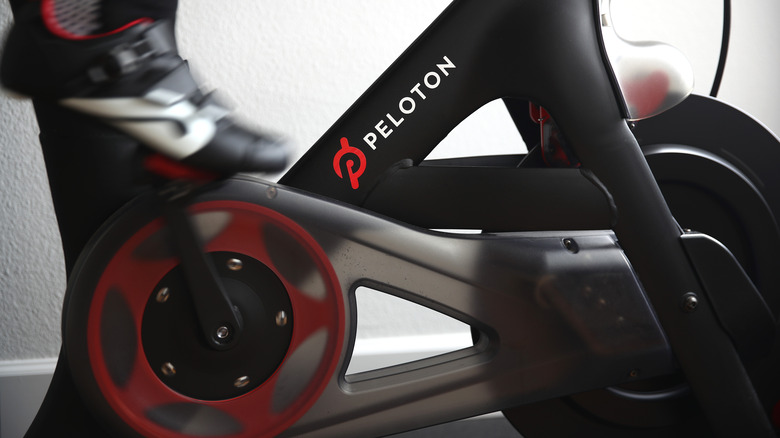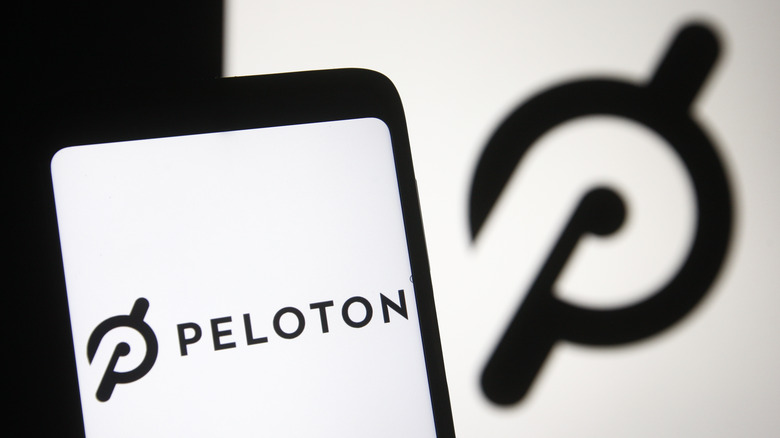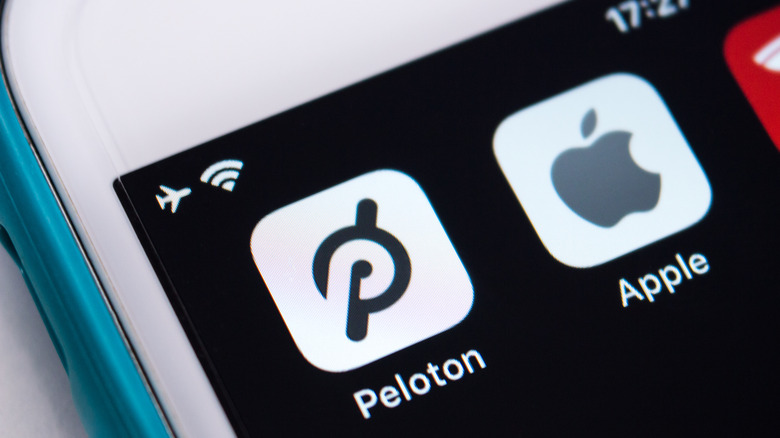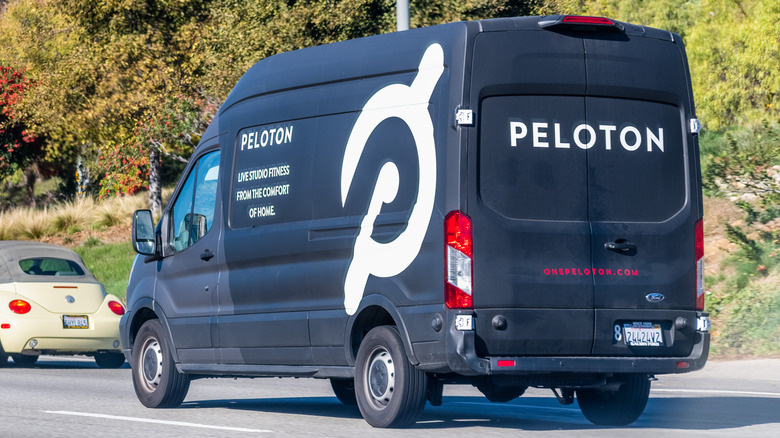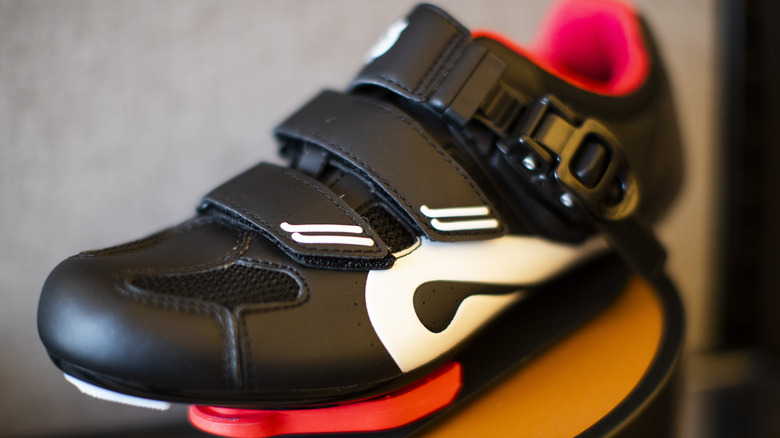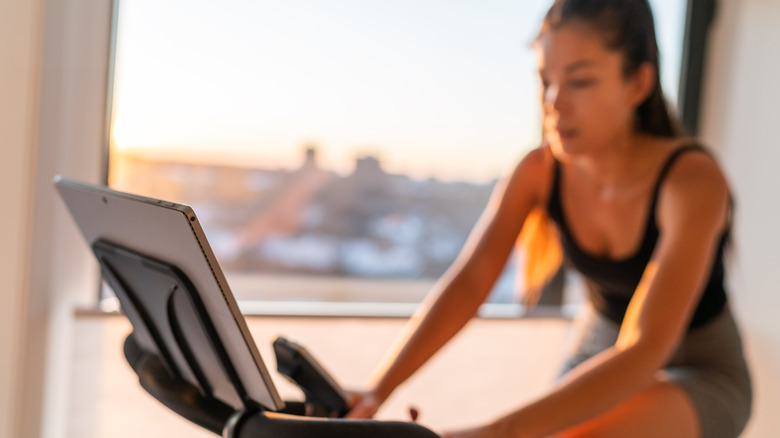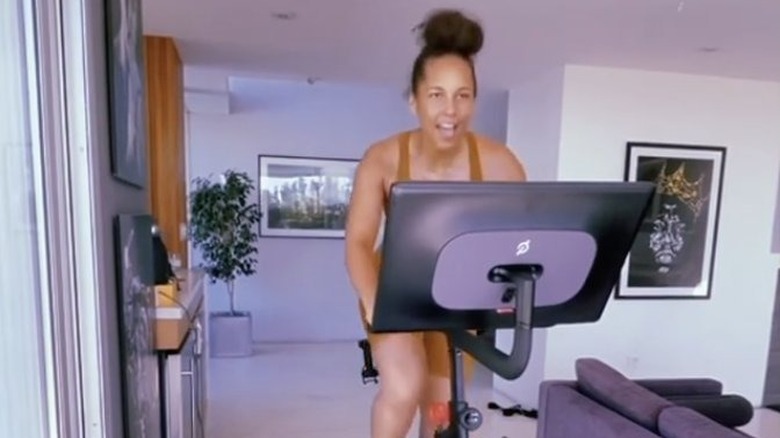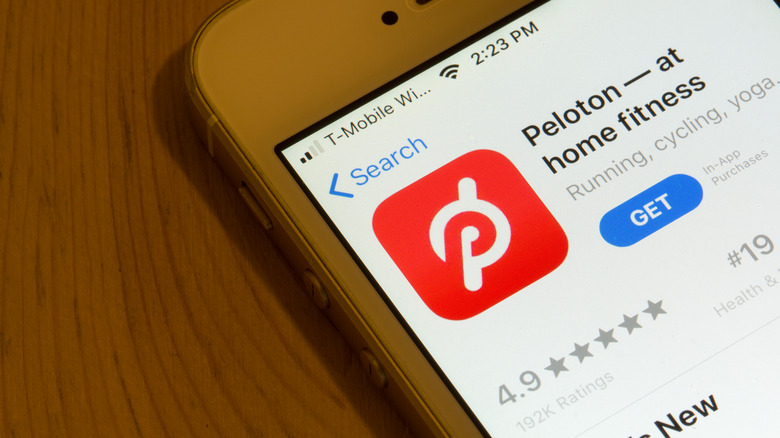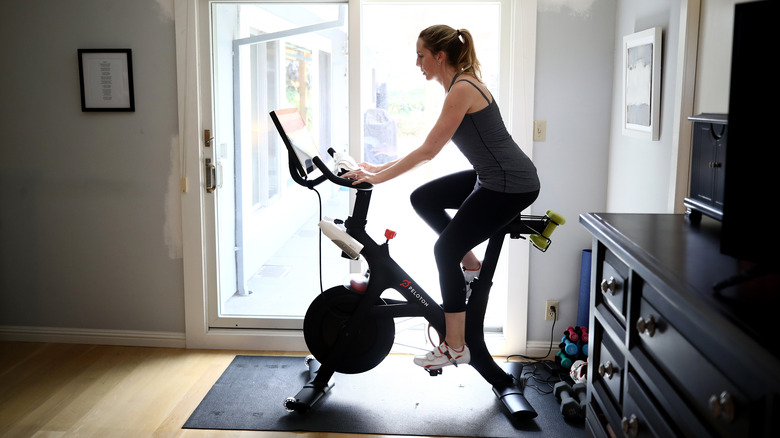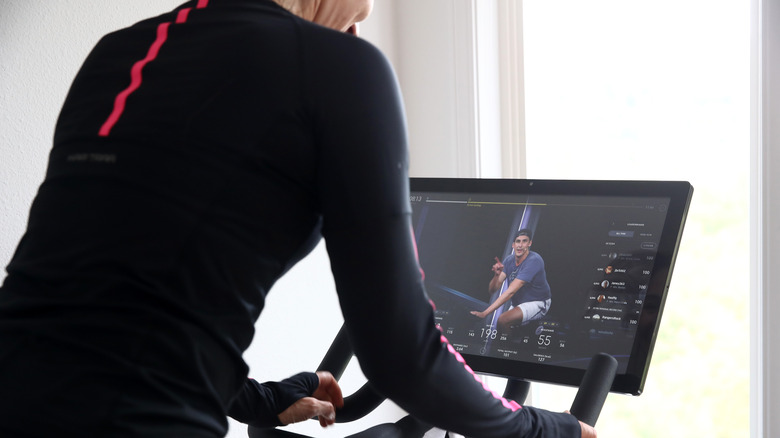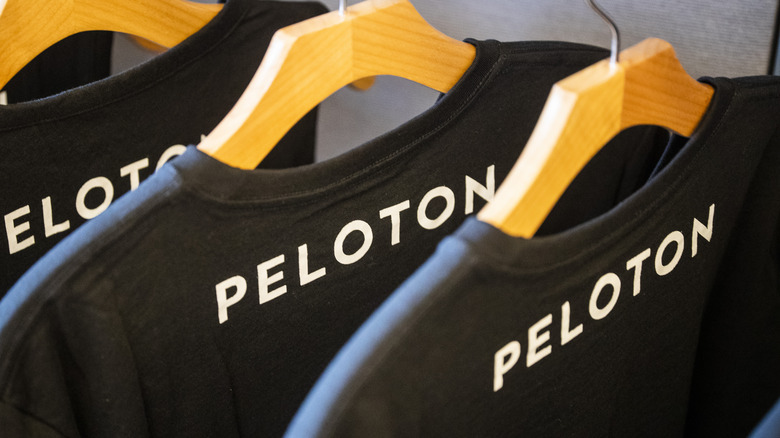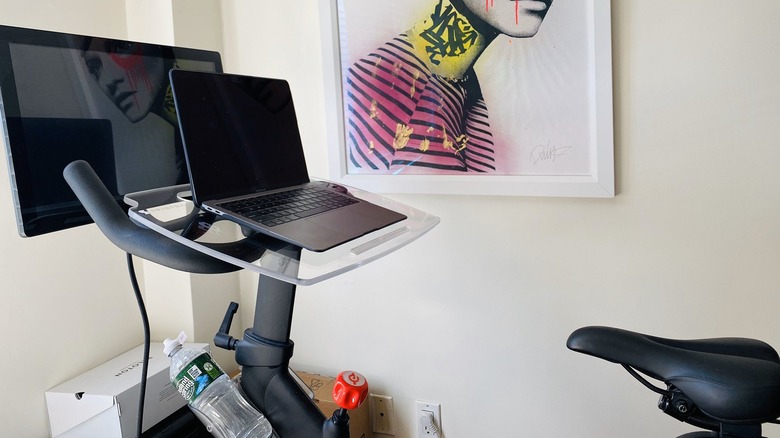What You Didn't Know About Peloton
Peloton has become increasingly popular at an extremely impressive rate since it first launched almost a decade ago. The brand offers impressive equipment like bikes and treadmills, but they also offer a variety of other classes like yoga, barre, pilates, strength training, meditation, boot camps, and outdoor runs that take place off the exercise machines. And while the price of Peloton equipment can be intimidating, financing options and cheaper memberships are available to lower your initial investment.
And as millions of people have become members of the Peloton community, more and more questions have arisen about the brand. So we've decided to round up some things you may not know about Peloton — whether you're a longtime lover of the brand or completely unfamiliar with the company. Let's dive in.
The very beginning of Peloton's story
While Peloton has become a household name over the past few years, the current CEO and co-founder of the company, John Foley, first pitched the idea to his former colleague and COO Tom Cortese over dinner. Cortese spoke to CNBC in February 2019 about Foley's idea to use technology to allow busy people to get the full instructor-led workout experience that you'd get at a place like Soul Cycle or Flywheel from the comfort of their homes. Cortese said, "John kept talking about this idea that it was difficult to find time to fit [fitness] in, it was difficult to find time with a great instructor at a great class, and it was incredibly expensive to pay this per-class fee." So the two agreed that an at-home bike would be a great place to start.
According to CNBC, they started off with only $400,000 in seed funding from investors and they officially launched the Peloton brand in 2012. And if you're wondering where the name Peloton came from, Foley named the company after the French word for a group of bicycle racers who ride closely together, aka a "peloton." By 2013, they had built a prototype and launched a Kickstarter page for the bike. You can actually still view the original Kickstarter page and see that they raised over $300,000, which exceeded their $250,000 goal.
How Peloton gained momentum and raised millions of dollars
Peloton currently makes most of its money through user membership and equipment sales. But before they were selling bikes at the rapid pace they are today, they had some major investors believe in the brand. According to AngelList, after Peloton started with $400,000 of seed funding, they received $3.5 million for product development later on in 2012. Two years later, after raising the $307,000 on Kickstarter, they received a whopping $10.5 million in Series B funding. Built In NYC reported that they used this money to update and modify the original bike.
Then, as time went on and more and more people purchased the bikes, Peloton received $30 million in Series C funding, which TechCrunch said was "in order to expand brick-and-mortar retail locations and accelerate bike production." And by 2018, as the Peloton brand became a household name, they raised another $550 million, bringing the company's valuation to $4.15 billion (via The Wall Street Journal). This was all before the company went public in 2019 and subsequently became worth $30 billion in 2020 (and some think that could double to $60 billion over the next four years).
Why Peloton is called the "Netflix for fitness"
You may have heard the phrase that Peloton is like the "Netflix for fitness," but what does that mean? Well, much like Netflix allows us to stream top-quality movies from home, Peloton allows its customers to get fit without leaving their houses. On average, Peloton streams over a dozen live classes a day and also has a catalog of thousands of on-demand classes. And in a 2019 pitch to big investors, CEO and co-founder John Foley claimed that they're not just in the business of selling workout equipment, they're selling something bigger.
Foley said, "It is no secret that exercise makes us feel good. It's simple science: exercising creates endorphins and endorphins make us happy. On the most basic level, Peloton sells happiness" (via Business Insider). Foley also added that "Peloton is so much more than a Bike." Not unlike Netflix or Apple, they believe they created "one of the most innovative global technology platforms of our time." And Foley really wasn't far off at all. Outlets like Forbes have even said that Peloton deserves a "richer valuation" than companies like Apple.
Pelotons ongoing issues with slow delivery aren't new
If you or someone you know ordered a Peloton exercise bike or treadmill in 2020 or 2021, you know that the wait times for deliveries have continued to grow. As COVID-19 cases skyrocketed and gyms closed, the demand for Peloton machines went through the roof. The company could hardly keep up with the deliveries and The New York Times even said their growth was threatened by slow deliveries.
After purchasing the bike or treadmill, "customers are given a delivery date of anywhere from three to 10 weeks from purchase. But on delivery day, Peloton either suddenly reschedules or never shows," according to the outlet. By February 2021, the company revealed they were going to be investing more than $100 million to try to speed up slow deliveries (via The Verge).
While this issue was exacerbated during the at-home fitness boom of 2020, slow delivery problems actually aren't new to Peloton. As long ago as 2015, Peloton members took to social media and blogs to share their frustration dealing with delayed delivery windows and problems with customer service.
You don't have to wear official Peloton cycling shoes
When buying a Peloton bike, the company may entice you with a mat, light weights, and Peloton-branded cycling shoes. You will need a special kind of clip-in shoes to ride the Peloton bike, but the shoes Peloton sells cost $125. Thankfully, promo codes are available to lower the price. However, what some people might not realize is that you don't have to wear Peloton shoes at all.
The Peloton bike's pedals are compatible with other, less expensive cycling shoes. Unless you want to spring for the name brand, you can save your money for something else. Additionally, you can completely swap out Peloton's pedals for other ones that may work better with the cycling shoes you already own. However, Shape cautioned, "Changing your pedals out to aftermarket ones will void the Peloton warranty on the pedals (not the rest of the bike, just the pedals)." Wearing different shoes, however, will have no effect on your warranty.
You can ride on Peloton bikes at international hotels
Whether you've been wanting to try out a Peloton bike or you're an avid member who doesn't want to lose their streak, using Peloton equipment in a hotel is a new level of luxury. On the official Peloton website, you can find their hotel finder that allows you to see an interactive map with hotels across the United States, Canada, and Europe that have bikes. There are certain hotel chains, like Westin, that have partnered with Peloton to include bikes in many of their fitness centers and even some guest rooms. And if your favorite hotel isn't listed on the hotel finder, you can suggest a hotel for Peloton to partner with.
This tool is perfect for you if you're not only the kind of person who loves to work out on vacation, but literally plans your travel around your workouts. That's a level of commitment that deserves some serious respect!
Many celebs are fans of Peloton, and you can ride with them
Are tars really are just like us? Well, when it comes to their love of Peloton, yes. Celebrities from Olympic athletes to Grammy-winning artists have shown off how much they love Peloton workouts on social media. In 2021, Miley Cyrus and Lizzo both sang their popular songs while running on Peloton treadmills. Then, Alicia Keys followed suit on her Peloton bike. These artists riding and running on their Peloton equipment might have been totally relatable, but their vocal abilities while doing so certainly were not.
Athletes like Megan Rapinoe, Rory McIlroy, Booger McFarland, Bubba Watson, Allyson Felix, and more have also spoken out about how much they love Peloton workouts, with many of them competing in the Peloton All-Star Ride, which aired on ESPN in 2020. And if you want to ride alongside some of the best athletes in the world and some of the most famous celebs, Peloton users have created entire lists of all the stars' usernames so you can add them as friends and work out with them. See you on the leaderboard, Joe Jonas (aka cup_of_joe)!
You don't have to have a machine to be a Peloton member
When people think of Peloton they usually think of their bikes and treadmills, but what some don't realize is that you don't actually need any Peloton equipment to be a member. Peloton is more than just their machines; they offer classes, like yoga and strength training, that all take place off their fitness equipment. To access the classes with Peloton equipment, you'll need to buy the All-Access Membership, which retails for $39 per month. As some have noted, the monthly fee is around the same price as just one or two in-studio spin classes.
If you don't have a Peloton bike or treadmill, you can access the less expensive Digital Membership for $12.99 a month. With it, you can "use the Peloton App to access thousands of classes and train with equipment or none at all on your phone, tablet, TV, and web," the company explains. You can also try the app for free for 30 days before becoming a paying member.
Many people who have the Digital Membership purchase their own cheaper bikes and take the classes on their tablet or smartphone. They call themselves "Feloton" members, as in fake Peloton. So if you've been wanting to try Peloton but don't want to pay the thousands of dollars for their machines, there are other options out there!
Peloton has millions of active subscribers
With stay-home orders in place and gyms closed, Peloton's sales boomed. But according to CNBC, not only did sales skyrocket but their subscriber numbers "surged at a triple-digit rate." By September 2020, Peloton supposedly had 4.4 million active users (around a million with the bikes/treads and another 3 million just with the app). But Peloton co-founder and CEO John Foley believes they can reach 100 million subscribers.
During Peloton's first investor meeting as a public company, Foley said, "100 million subscribers, we believe is a reasonable goal. There's close to 200 million gym-goers in the world. That's 200 million people paying hard money, month after month, to access what we believe to be inferior fitness equipment in an inferior location" (via CNBC). Foley also shared the things Peloton needs to do to reach its goal.
Those six things are "core U.S. growth, product innovation, geographic expansion, greater affordability, digital expansion, and creating the best place to work in the world." So, in the coming years, it looks like we may be seeing Peloton available in more countries, at a more affordable price, with even more new features. This could be a win-win for Peloton and consumers!
Peloton has plans to expand to even more countries around the world
As of early 2021, Peloton is available in the U.S., the U.K., Canada, and Germany. In March 2021, the brand announced they had plans to expand to Australia, "marking the brand's entry to the Asia Pacific Region." For their Australian debut, Peloton plans to start off by introducing the original Peloton Bike, the Peloton Bike+, and the Peloton App. The official Australian launch is projected for the "second half of 2021" — but that's not the only geographical expansion Peloton has its eyes on.
In a February 2021 interview with KeyBanc, Peloton's CFO Jill Woodworth spoke about international expansion. She noted that the company is hoping to expand to one to two new markets per year. As of this writing, the WIPO IP Tool shows that Peloton has 140 trademarks filed worldwide (via Focus). These trademarks could indicate which countries Peloton is likely to expand into next. Some of the countries on that list include China, Israel, Korea, Mexico, the Philippines, New Zealand, Singapore, Switzerland, and more (via PeloBuddy).
Additionally, fans think there could be some Spanish language classes coming after they spotted job postings hinting at creating Peloton content in Spanish. It's an exciting time to be a Peloton fan, that's for sure.
Peloton instructors have extremely impressive backgrounds
Although Peloton instructors are a huge part of the company, you may not know much about them. Let's change that. The instructors come from a wide variety of industries; Jess Sims was a kindergarten teacher, Robin Arzon was a lawyer, and Ally Love, Emma Lovewell, and Cody Rigsby were all professional dancers (via AdWeek). Others, like Olivia Amato and Ben Aldis, worked in the finance world before trading their suits for spandex.
A few instructors' paths to Peloton are particularly unique and impressive. Tunde Oyeneyin has been open about struggling with obesity while growing up. During an interview with Today, Oyeneyin revealed that when she was 13, she weighed 200 pounds and wore a size 18 before she started focusing on fitness. Fellow instructor Sam Yo also has a very unique background as a Buddhist Monk.
Yo told People that at 23 years old, he put his life on hold and moved to a monastery in Thailand. He explained that he planned on staying at the monastery for a month or so, but he ended up staying there for almost a year. And lastly, Peloton instructor Christine D'Ercole is a world and national track cycling champion. She's actually the only Peloton instructor with these impressive cycling accolades – and if you've taken her classes, you know she's a cycling pro.
Peloton has an entire community off the bike and tread
While the Peloton community comes through strong with high fives and hashtags, the community off of the bikes and treads is equally impressive. There are countless groups on social media with anywhere from a few members to hundreds of thousands of members where you can connect with other Peloton users. In these groups, Peloton members discuss everything from their workouts to their favorite Peloton instructors to what items they got from a recent Peloton apparel drop. Additionally, people use them to hold each other accountable for workouts and schedule rides together.
The unofficial Peloton news site PeloBuddy also compiled a list of several hundred of the Peloton social media groups and organized them into categories like instructor fan pages, age-based groups, teams for women, weight-loss groups, and more. So there really is a community for everyone — both on and off the equipment.
Could Peloton's apparel line grow to be larger than Lululemon's?
Peloton is in the business of selling fitness equipment and memberships, but you might not realize that their apparel line is also a major part of their brand. The Wall Street Journal even reported that they could beat out brands like Nike and Lululemon as they continue to "[build] out its fashion team in a bid to become a 'lifestyle brand.'" And if you've ever tried to get your hands on Peloton clothes, you know that it's no joke. The items sell out quickly and there are entire Facebook groups with tens of thousands of members that are dedicated to buying, reselling, and trading Peloton apparel.
While Peloton apparel is already extremely popular, Peloton founder John Foley's wife and VP of Apparel, Jill Foley, said it's part of the company's strategy to continue to grow the apparel side of their business. She told Glossy, "Apparel is a great way for us to engage with our dedicated members." It's her goal to "get Peloton apparel on as many members as possible." Since then, the company has released collaborations with major brands like Adidas, and their apparel is only getting more and more popular.
There's countless Peloton accessories on other sites like Amazon and Etsy
While Peloton-brand apparel and accessories — from muscle tanks to bike mats — are great, plenty of other companies have created Peloton-compatible products. For example, if you want to have your phone close by while riding your bike, Amazon sells a number of after-market phone mounts. And if you want somewhere to hang your shoes or towels, creators on Etsy have designed entire wall organizers for your workout gear. Or, if you prefer to keep your towel handy, you can purchase a hook to attach to your handlebars. There are even stickers and letter boards to celebrate major Peloton milestones.
And as if all of that weren't enough, you can literally turn your Peloton bike into an exercise desk for the ultimate work-from-home experience. If you can think of a modification for your Peloton bike or treadmill, there's probably an item out there for you.

